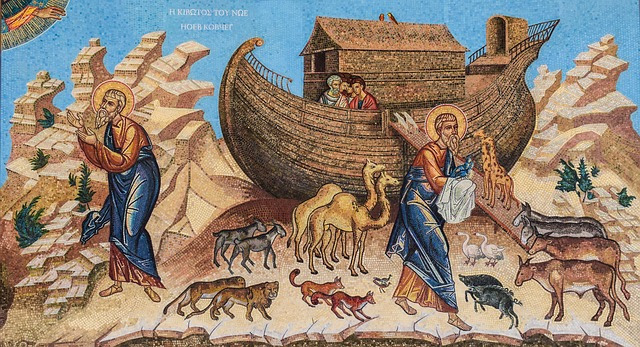Did the flood happen? As described in the book of Genesis, in its details it is impossible. All the species of the world could not be contained in one boat the size of the ark, nor indeed, the food needed for them to survive over a hundred days (the time of the flood and its recession). Indeed, all the species of the world would not be present in one place –where a man named Noah lived. We must see it, instead, as a parable, a story that nonetheless, tells us about a reality that truly exists. There may be some history behind the story, for the civilizations of the Middle East all have flood stories, though the date and time and circumstances are lost in myth.
The reality that exists, however, is the sinfulness of the human race. There is hatred, corruption, evil, and deceit endemic in our society. Life is more than living, breathing, eating and reproducing, it is also deification, unfolding the image and likeness of God the Creator in our very own being. We can do this only by faith and hope in God, and by love of God, who is love. Does God hate us and desire the destruction of the whole human race, and, indeed, all life? The story of the flood tells us a truth, that we have distorted God’s gift so much that we no longer deserve life. We must, however, be sensitive to God-talk. Does God hate or does God repent? There are not emotions in God anything like human emotions, for God is Spirit. This means that God is not simply a cold, icy, thinking machine – no, he is the creative force, out of one action beyond human comprehension that is simultaneously love and mercy and justice and goodness, all at once and together, so that we cannot only say “God loves,” but that “God is love.” Our human emotions, linked to bodily chemicals, are only pale shadows of the intense, unitive act that is God. Understanding this, we only receive what we deserve.
The Anaphora of St. Basil the Great, read every Sunday in the Great Fast, tells us, “For you did not turn away from your creature forever, O Good One, nor forget the work of your hands; rather, you intervened in various ways because of your merciful loving-kindness.”
The Great Fast must be a time of the renewal of our commitment to Christ made at baptism, so that we will find not death in sin, but life in God.
Meditation by Archpriest David Petras
